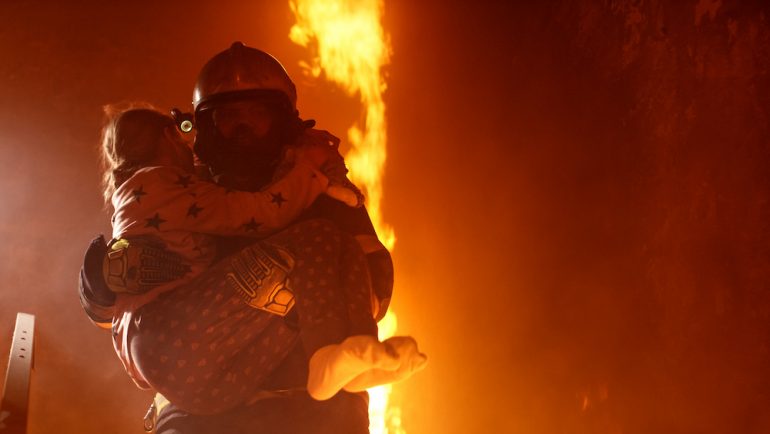One simple action — closing your bedroom door before going to bed at night — could save your life. A practice known in the fire safety field as “close before you doze,” that simple act gives you precious minutes to escape in a catastrophic house fire.
The facts about fire
Today’s building materials and furnishings are more combustible than in the past because they’re made of synthetics. Additionally, modern homes are bigger than in past generations. These factors have cut escape time during a fire from almost 20 minutes a generation ago to about three minutes. Simple steps can make a big difference in survival.
Preventing house fires
No one wants to contemplate the horror of a devastating fire. But with simple preplanning, much can be done to prevent that calamity.
- Do not allow flammable material near sources of heat and flame. No kitchen towels and hot pads near the stove, nothing stored close to the water heater, nothing that can ignite next to the fireplace. Do not run electrical cords under carpet, and do not overload plugs into a power strip. Never operate a grill inside the home.
- Purchase and place fire extinguishers around potential fire areas: the kitchen, garage and outdoor grill.
- Each year, there was no working smoke detector in half of all residential fire deaths, so make sure yours are working. A high percentage of deaths occur in the overnight hours when people are sleeping, making working smoke detectors vital. Test detectors, both for fire and carbon monoxide, several times per year and keep the batteries fresh. Your alarms should be interconnected so that if one alerts, they all do. Replace alarms that are 10 or more years old.
- Develop an emergency plan before a fire strikes. You and your family members should plan one or preferably two escape routes to the outside from every room of the house. Coordinate a meeting place for all family members outside. Carry out surprise fire drills to test each person’s readiness.
What to do when disaster strikes
Having your bedroom door closed makes a huge difference in the time you have to respond to a fire. If your alarms are interconnected, a fire elsewhere in the house will sound the alarm in your bedroom.
The temperature in a room with a closed-door can remain at 100 degrees, whereas with the door open it can soar quickly to 1,000 degrees. Smoke and carbon monoxide also skyrocket with an open door. Smoke tends to stay higher in rooms, which means there is less smoke to pass under a closed door.
Here are some additional steps to keep your family safe.
- Place unrolling ladders in the windows of upstairs rooms to use if escape routes through the house are cut off.
- If a pet or family member does not make it outside, do not go back in the house to rescue them. Alert firefighters and they will find the loved ones. They are trained and have the protective gear to do so.
Related – Watch Out for Dryer Fires!


